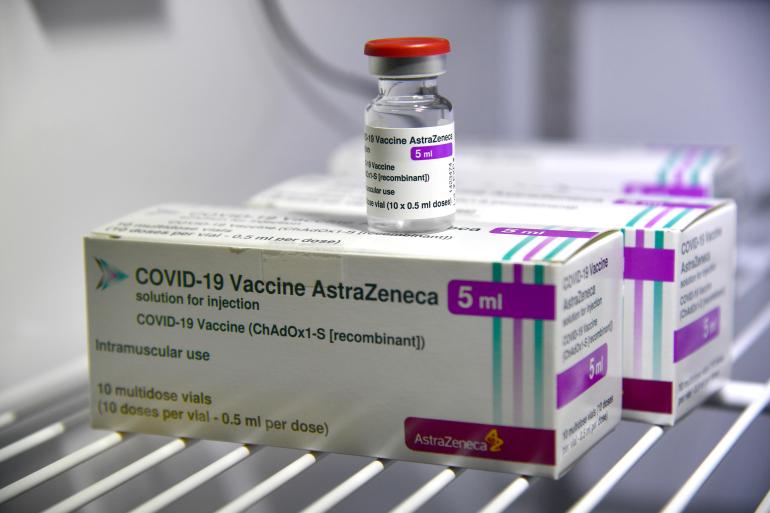‘Extremely promising’: 1st dose of COVID vaccine cuts illness
Separate studies from England and Scotland show that risk of illness and hospitalisation reduced from first jab.

Data from two separate studies published in the UK, one in England and another in Scotland, have shown vaccines against COVID-19 are effective in cutting disease transmission and hospitalisations starting from the first dose.
Analysis from Public Health England (PHE) published on Monday shows that the vaccine manufactured by Pfizer-BioNTech reduces the risk of catching infection by more than 70 percent after the first dose. That risk is reduced by 85 percent after a second dose.
Keep reading
list of 3 itemsOxford–AstraZeneca vaccine: What to know, in less than 500 words
WHO approves Oxford-AstraZeneca COVID vaccine for emergency use
“Overall, we’re seeing a really strong effect to reducing any infection, asymptomatic and symptomatic,” PHE’s strategic response director Susan Hopkins told a media briefing.
In a statement posted on social media, Matt Hancock, the secretary of state for Health & Social Care, welcomed the development as “incredibly good news”.
“It shows that the vaccines work and it shows that vaccines save lives.”
The public health body’s study of real-world data also shows those vaccinated people who do become infected are far less likely to die or be hospitalised.
Hospitalisation and death from the virus is reduced by more than 75 percent in those who have received a dose of the Pfizer-BioNTech vaccine, according to the analysis.
The UK is among the world’s hardest-hit countries by the COVID-19 pandemic, with almost 121,000 deaths, according to data from Johns Hopkins University.
It was the first nation to begin mass vaccinations in December and more than 17 million people – roughly one-third of the UK’s adult population – have now received at least their first dose of the vaccine.
“We will see much more data over the coming weeks and months but we should be very encouraged by these initial findings,” Dr Mary Ramsay, Head of Immunisation at Public Health England, said.
‘National evidence’
At the same time, a study in Scotland has shown the Pfizer-BioNTech and Oxford-AstraZeneca vaccinations have led to a reduction in COVID-19 admissions to hospitals after the first dose.
The study, led by the University of Edinburgh, found that by the fourth week after receiving the initial dose the Pfizer vaccine reduced the risk of hospitalisation from COVID-19 by up to 85 percent.

The Oxford-AstraZeneca vaccine reduced the risk by 94 percent.
“These results are very encouraging and have given us great reasons to be optimistic for the future,” Dr Aziz Sheikh, who led the research, said in a statement.
“We now have national evidence – across an entire country – that vaccination provides protection against COVID-19 hospitalisations.
“Roll out of the first vaccine dose now needs to be accelerated globally to help overcome this terrible disease,” he added.
The research compared the outcomes of those who had received their first jab with those who had not.
It found that vaccination was associated with an 81-percent reduction in hospitalisation risk in the fourth week among those aged 80 years and over, when the results for both vaccines were combined.
"This is incredibly good news, it shows that the vaccines work and it shows that vaccines save lives."@MattHancock welcomes @PHE_uk data which shows that hospitalisation and death from #COVID19 is reduced by over 75% after the first dose of the @Pfizer/@BioNTech_Group vaccine. pic.twitter.com/wcACTEHm1Y
— Department of Health and Social Care (@DHSCgovuk) February 22, 2021
‘Extremely promising’
The project, which used patient data to track the pandemic and the vaccine roll out in real-time, analysed a dataset covering the entire Scottish population of 5.4 million between December 8 and February 15.
Some 1.14 million vaccines were administered to 21 percent of the Scottish population during the period.
Some 650,000 people were given the Pfizer vaccine while 490,000 had the Oxford-AstraZeneca vaccine.
It is the first research to describe the effect of the vaccinations on preventing severe illness resulting in hospitalisation across an entire country.
Previous results about vaccine efficacy have come from clinical trials.
The study team said the findings were applicable to other countries using the Pfizer and Oxford-AstraZeneca vaccines.
The data reported “is extremely promising,” said Arne Akbar, the president of the British Society for Immunology.
“Although there does seem to be some difference in effectiveness levels measured across age groups, the reduction in hospitalisations for the older age groups is still impressively high,” he said.